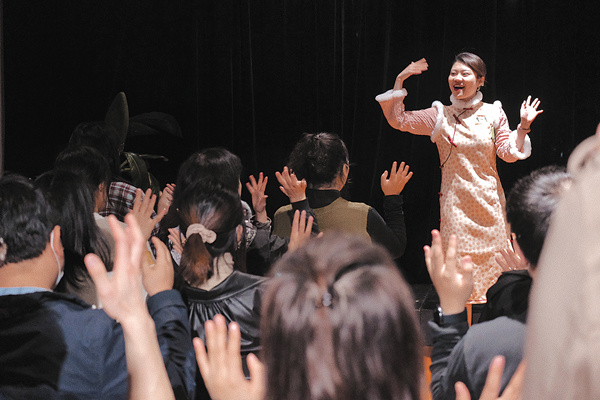

New direction
However, the market can be cruel and temporary. In 2018, Xu's company lost several important corporate training contracts to its competitors. After that, Xu went to Stanford University in California, United States, to further deepen her understanding of improv.
Sure, it was an improvised decision, but also one with a clear purpose, as she learned from Professor Patricia Ryan Madson, the author of Improv Wisdom: Don't Prepare, Just Show Up. Madson founded an improv club in 1991 at Stanford University and had taught the course since 1977. She retired in 2005, but still teaches part time.
Xu says the professor was impressed with her sincerity to learn.
"My book has nine versions, including English, but I barely received any feedback from China," Madson told Xu. "You are my first Chinese student to fly from the mainland."
Her time in the US was beneficial. Xu stayed at Madson's house and became a teaching assistant on the improv courses. It was also eventful. She contracted COVID-19 and fortunately recovered, Xu says.
She attended an improv performance at a theater in North Carolina, and redefined her understanding of the art form. "It was an improv performance on Valentine's Day in 2019, themed around love. The host said at the beginning 'if you laugh today, then it's a comedy; if you don't, then it's drama'," Xu recalls.
She agreed with the idea and, consequently, she always gives that definition when people ask what improv is. "The right to define the art form is that of the audience. I also have the right to define what I am doing. I think improv is a drama, but it contains parts beyond laughter," Xu says.
Xu's overseas study experience gave her the courage to return to the marketplace, but she says improv is still a niche field, not yet an industry. Chinese students in school "are good at executing the standard answer told by their teachers, but improv requires creativity", Xu explains.
However, improv art-as a decompression and experiential activity-has been increasingly welcomed by enterprises and schools, Xu says.
It helps young people with their need to express themselves and be recognized, Xu adds.
Improv, ironically, helps reduce pressure, provides a feeling of excitement and a sense of achievement, and improves mental agility.
Moreover, people put aside judgments of what is absolutely right or wrong, and a consensus of "tolerance, permission and non-judgment" can be formed.
"We can quickly break the boundaries between strangers within a two-hour improv event and quickly get to know partners with the same hobbies or very different personalities," she says.
Initially, Xu's company only focused on team building, but gradually Xu and her colleagues "developed the Stanford University's improv life course on growth and healing".
"Recently, we tried to perform in a small theater and established 'a new business' section, hoping to take theater as the core space, to deeply cultivate, operate and serve the surrounding people, and then copy this model to other spaces.
"There's no best decision, just make one, and make it the best," she advises.